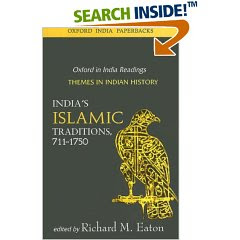The Mahdawiyah and historiography from below

right now I am reading a good anthology of scholarly articles on Islamic Indian Traditions and it is neat peering into the vast corners of 'medieval' Indian history. In the introduction there is a good discussion on the concept of religion as often misunderstood as a monolithic tidal force. I hate everytime I hear nationalists (be they of the Geert Wilders or Shiv Sena or the moral majority variety) talk about the 'Islamic conquest' as a single historical event marked by military campaign. Like Tours to Jakarta was brought under the Caliphate before Abu Bakr could say 'open sesame'. what in actuality was complex relations and rivalries between ethnic and monarchial alliances (moors loyal to the ummayads vs. rival visigoth kingdoms; turks fleeing from the mongel invasion resettling in Northern India (I even feel like I am oversimplifying these descriptions! As I try to pin down any particular group in history (delhi sultanates for example)) when huntington-ized becomes a catch-all green terror.
There is also a good discussion of the concept of 'conversion' and how semantically it is worthless in the Medieval Islamic context. This is important since so much fear (at least from what I've seen in hindutva camps) is is fueled by the threat of conversion and prostelyzing. you'd be hard pressed to find anything empirical to support this, since it was made abundantly clear in another comparitive article that historiography was loyal to a fault to its royal patrons during this period and therefore focused exclusively on the archetypal manners of kings and sultans (which were actually blind pawns in the teleology of Islamic determinism), but they claim that conversion was such a long and multi-faceted process that thinking of when populations became 'muslim' is just as reifying of religious identity as any of the historically blind clash of civilizations crowd's spiels.
Which brings me to the question I thought about while reading about the mahdi millenial movement led by syed muhammad jaunpuri (look at how many people have claimed to be the mahdi !) What is an appropriate form of historiography to understand the role of religion as a genus for the species of cultures and empires that are taxonimized under it? what actually is the socio-cultural characteristic we aredescribing of Islam when we talk about the Dehli Sultanates and the moors in Spain as being 'Islamic'? It's not merely jizya and shari'a (the sultans of Dehli couldn't make up their mind about it). It's not the role of 'uluma, it's not long beards and minarets, what is the kernel of Islamic identity in common that can be dealt with as a substantial historiographical category? For materialist history, of which I blindly support without having read more than zinn and the 18th brumaire, where does this religious taxonomy fit in other than abandoning it to the 'superstructure' like some apathetic diamat scholar? what sort of category is Islam in the scheme of history? I think a history from below, which was hinted at by MacLean in 'the sociology of political engagement: The Mahdawiyah and the state' paints a very useful picture of this social/religious movement, but yet again, in the term social/religious, what does the / stand for? Is the Mahdi a useful metaphor for the ideological catalyst of political activism and rebellion like Shari'ati's red shi'ism? Is the orthodoxical opposition to the Mahdi (Jaunpuri) a clash between orders of the Symbolic (is Zizek, or Lacan for that matter taboo in materialist historical circles?) But then again, to the extent that the Muslims in India were just plain 'turks' for the most part in the eyes of 'hindus' (who self-identified as linguistic-ethnic groups rather than hindus, well who the fuck knows how they self-identified) so maybe religion isn't a valid category in the bigger scheme of historical development (whoops, I'm back where I started). I guess the real question is how does material historiography counter huntington-ization of religious military-political history, regardless of the true place religion holds as being a description of 'types' of regime/kingdom/army.

Comments